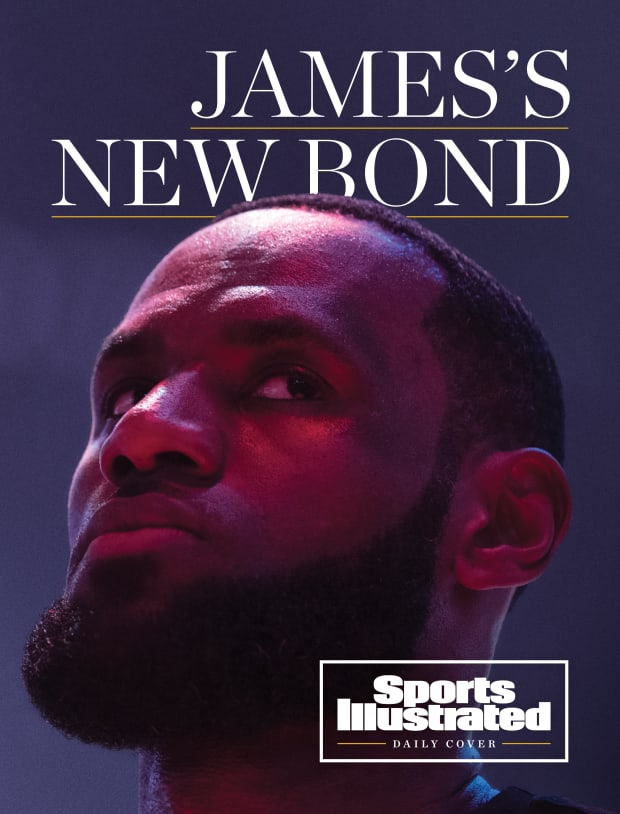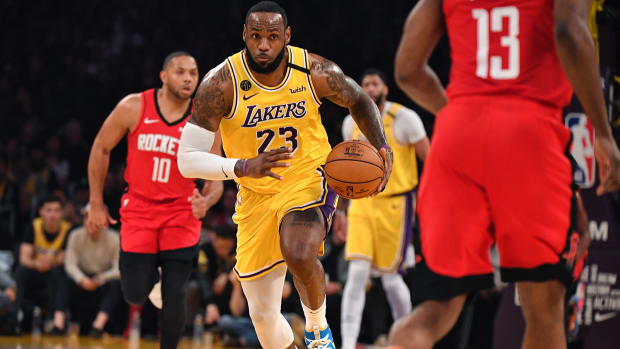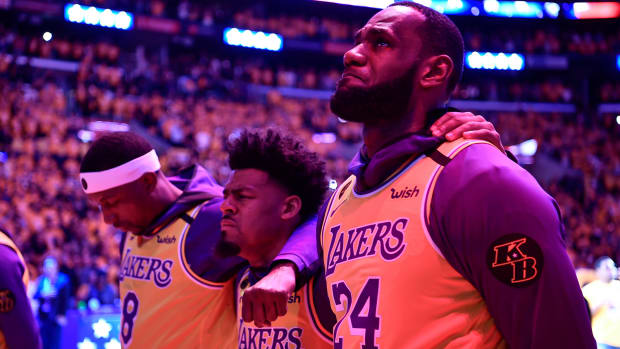In a season filled with upheaval, LeBron James has taken on a new position with new running mates in a quest to give LA its most meaningful title. But will he get the chance to see it through?
In another reality, one not irrevocably altered by the
spread of COVID-19, the novel coronavirus, the excitement in Los Angeles would be palpable. The Lakers were back, sitting atop the Western Conference standings, poised to end a six-year playoff drought. The poor chemistry that defined last season’s 37-win team had been replaced by an unshakeable bond among the players of a team that racked up 49 wins before the NBA season was suspended on March 11. LeBron James, after showing signs of basketball mortality throughout the 2018–19 season, had surged back into MVP contention in this one. A championship run had become not just possible but probable, a franchise that was shaken by an unspeakable tragedy at midseason with a chance to give it a storybook ending, a superstar in James with an opportunity to line his résumé with a signature accomplishment. “I don’t think I’ll be able to have any closure,” says James, “if we do not have an opportunity to finish this season."An early window into the fire that raged inside LeBron James all season, that fueled a return to the MVP discussion, that pushed the Lakers from playoff outsider last season to title contender in this one, that afforded James his best chance at a championship since, well, his last one, just four springs ago—was delivered in a very 21st-century way: a cellphone video posted to Twitter that quickly went viral. In a mid-November game at Oklahoma City, after James was whistled for a foul, he glared at Marc Davis, a 22-year veteran referee. “I know you have been reading that I haven’t been playing defense the last couple of years,” James said. “But it’s a new year.”

New year, old LeBron. Old, chronologically, sure—at 35 James is the team’s senior citizen. Old, retro, absolutely. Not since James’s Miami years has he turned in such a complete season, a juggernaut on offense who also suffocates opponents big and small. In one March weekend he outplayed his MVP competition, Giannis Antetokounmpo, with 37 points, eight rebounds and eight assists in a win over the East-leading Bucks, then, with a 28-8-9 line, engineered an emphatic defeat of the Clippers, the favorite to face the Lakers in a mouthwatering, intramural Western finals. No player his age has ever had a better season.
Redemption for James, a return to prominence for the Lakers—Hollywood couldn’t write a better script. Except that story, that script, changed on Jan. 26.
The Lakers’ team plane lifted off the Philadelphia tarmac just after 11 a.m., and within minutes the cabin of the luxury 757 went silent. Seats reclined. Windows snapped shut. Movies flickered on iPads. Hours earlier Los Angeles had finished off a five-game road trip. The 8:30 p.m. start against the 76ers meant the Lakers didn’t get back to their hotel until well after midnight. A few players ordered room service, chewing on hamburgers and chicken wings. Others just collapsed, trying to sneak in some sleep before the wakeup call a few hours later. “Our plane is never quiet,” says Jared Dudley. “But when we took off, everyone was out.”
Toward the back coach Frank Vogel stared intently at a laptop as clips from the 17-point loss at Philly flashed across the screen. Vogel cringed watching Ben Simmons knife through his top-five defense. Midway through the flight Alison Bogli, the Lakers’ longtime PR staffer, approached, ashen-faced. There’s a report that Kobe died, Bogli told Vogel. We’re checking it out. Vogel was stunned. “Didn’t believe it,” Vogel says. “Had to be wrong.” An hour later, Bogli returned. Word had come from the ground: Kobe Bryant was gone.
By then the news had started working its way among the players. Backup center Dwight Howard, who played one season with Bryant in L.A., was the first to spot the TMZ report. Howard woke All-Star power forward Anthony Davis, who woke LeBron. Shock yielded to doubt.
Vogel inhaled deeply. A year ago he was unemployed after being fired by the Magic. The Lakers hired him last spring only after Ty Lue and Monty Williams turned them down. Pundits saw Vogel as a placeholder. The Los Angeles Times asked, in a headline, ARE THEY KIDDING? Jason Kidd, shoehorned onto Vogel’s coaching staff, would surely take over by Christmas. But Vogel won the respect of both James and Davis. He persuaded James that his best position was point guard and, in a league trending smaller, built an elite defense backstopped by two shooting-challenged centers. Vogel has been a steadying presence. As the plane zoomed across the Midwest at 30,000 feet, he would have to be again.
One by one, Vogel addressed the players. Some had questions. Others just looked back in stunned silence. Several were still asleep. When Vogel woke shooting guard Danny Green, he thought he had been traded. Backup point Quinn Cook, groggy, needed a moment to process whom his coach was talking about it. “I was crushed,” Cook said on the Inside the Green Room podcast. “I was crying the whole flight.”
For several minutes James sat, motionless. Kobe? A night earlier, he had passed Bryant for third on the NBA’s all-time scoring list. Hours later, the two shared a phone call as several teammates gleefully listened in. The horror of Bryant’s death washed over him. Finally, he walked to the back of the plane. He sat down and spoke in hushed tones with Davis, a new teammate with whom he has grown close. Eventually, James gathered the team and led it in prayer. For two hours players refreshed Twitter, searching for any details on the crash, anxiously waiting for the flight to end. “There’s not one emotion you can pin it to,” says reserve guard Alex Caruso. “There were a lot of things: confusion, sadness, question, doubt. There was so much going on.”
In Los Angeles, success is measured in banners. The 16 hanging inside Staples Center are the bar. By any metric, the Lakers have had a strong season. At 35, James continues to put up eye-popping numbers. Davis, 27, has regained his All-NBA form and is a front-runner for Defensive Player of the Year. Even Howard has worked out in his second stint with the team following the disastrous 2012–13 season. GM Rob Pelinka, badly battered last spring by his former boss, Lakers legend Magic Johnson, has assembled a deep, championship-level supporting cast.
Expectations are high. The tragedy in January raised them higher. If the NBA can restart its season, those expectations will return. Win one for Kobe? The Lakers won’t say it. But a whole city feels it.

In the summer of 1995, Warner Bros., needing to accommodate a leading man who doubled as the NBA’s biggest star, built a basketball facility on the set of Space Jam. The Jordan Dome, as it came to be known, had a regulation court, a weight room, locker rooms and a lounge. The pickup games drew NBA players from across the country.
Last summer James began shooting Space Jam 2, the follow-up film announced shortly after he signed with the Lakers in July 2018. His first season in L.A. was a rocky one. James struggled to connect with his new teammates. The locker room imploded at midseason, when L.A. engaged in public trade talks for Davis—with the team’s young stars wondering how many of them would have to be sent to New Orleans to get him. James himself battled through a left groin injury, missing a career-high 27 games in a 37-win season. He watched the playoffs for the first time since 2004–05, his second year in the league.
Some, including forward Jared Dudley, then with the Nets, wondered whether this was the beginning of the end for James. The burst wasn’t there. The first step was a beat slow. After Dudley signed a one-year deal with the Lakers last summer, James invited the 34-year-old to work out. Michael had the Jordan Dome. James had the Lakers practice facility, an El Segundo, Calif., headquarters James could operate out of.
Like Jordan’s, James’s pickup games drew a collection of NBA talent. Chris Paul and Draymond Green; DeMar DeRozan and Buddy Hield. On the first morning Dudley arrived at the facility at 5:30; he was greeted by the sound of James lifting weights. When the game started, James insisted that the Lakers who were there—Davis, Dudley, guard Kentavius Caldwell-Pope and center JaVale McGee—play together. Against a collection of All-Stars, James’s group won four straight. After sitting out a game, the pickup Lakers came back and won two more. Says Dudley, “LeBron wasn’t playing around that day.”
James’s revival comes from several factors. The extended offseason helped. For more than a decade he has been an NBA ironman. He played in at least 74 games in 13 of his first 14 non-lockout seasons. He has tacked on another 239—the equivalent of three extra seasons—in the playoffs. He has logged more career minutes than Vince Carter, who has been in the league five more years. Since 2010–11, each of his seasons has concluded in June. James has admitted that a rare April ending allowed him to refocus his mind and body.
Last September, five months after L.A. fired coach Luke Walton, Vogel gathered his staff for a retreat at a Beverly Hills hotel. He had a vision of how he wanted the Lakers to play—a five-out offense with an emphasis on spacing—but he wanted to hear ideas. Phil Handy, who coached James as an assistant in Cleveland, drew up some of the elbow actions that had worked well there. Mike Penberthy, an assistant with the Pelicans last season, told Vogel how they often sent Davis to the offensive end when opponents shot free throws, freeing him to get early post-ups. “In some ways, it’s not complicated,” says Vogel. “When you have two elite offensive players, less is more.”
Then, for 2 ½ hours at the team’s practice facility, Vogel and James discussed strategy. Vogel wanted to play up-tempo. James was all in. He wanted James to play point guard. James wanted to hear more. The Warriors’ style of using multiple ballhandlers had become a leaguewide trend in recent years. Vogel said he wanted James to become the primary orchestrator, “like Tom Brady back there,” zipping passes to cutting teammates. James is on track to lead the league in assists (a career-best 10.6 per game) for the first time.

“You have a 6' 8" ballhandler with great vision with shooters spacing the floor,” a Western Conference scout says. “It keeps the floor open, and LeBron can see over any defense because of his size. If you go under, it gives him space to get going down hill to the rim, which is unstoppable. With AD able to pop or roll, it makes the options unlimited.”
Vogel wanted a physical defense built around L.A.’s beefed-up frontcourt. The 6' 10" Davis, a two-position terror, is the top shot-blocker on the league’s best shot-blocking team. James has been named to an All-Defensive team six times—but not since 2014. In recent years, as age eroded his athleticism and his responsibilities on offense multiplied, the consistency of his D suffered. “Some would say he took plays off,” says an Eastern Conference assistant coach. “I’d say he stopped giving a f---.”
If time off healed James’s body, skepticism fueled him. A few weeks into the season, the hashtag #WashedKing started appearing on James’s social media posts. James has never fully explained it, just to call it his “personal motivation.”
Titles aren’t just won with talented players, though, no matter how motivated. Chemistry matters. The Celtics self-destructed last season because of locker room issues. The Sixers, an early-season Finals favorite, have looked like a collection of mismatched parts. The Lakers added eight new players last summer. In an effort to supercharge chemistry, James organized a workout week in Las Vegas. The team stayed together, at the Wynn. They trained together, at nearby Impact Basketball. They dined together. The first meal was a quiet affair. The last was rowdy, with players hanging out deep into the night.
These environments are where James is most comfortable. James, says Dudley, is a “guys’ guy.” He likes being around teammates on the road. He organizes outings. Dinners in Utah. Trips to watch games at a bar in Houston. He gets in players’ faces when he needs to. And he is quick to take ownership when he is wrong. Recently, James, frustrated with a blown play by sixth man Kyle Kuzma, got angry at him on the bench. In the locker room afterward, James apologized to Kuzma in front of the team.
“He just loves being on the team with the dudes who are with him,” says Caruso. “He’s really still a kid at heart. He’s obviously a father, a businessman, a global icon. But at the end of the day, for him, just being on the team and hanging out with the guys and playing basketball is one of his greatest joys.”
James has bonded with Davis, who has thrived in his role as running mate. They’ve had a strong relationship dating to 2012, when they were teammates with USA Basketball. They share the same agent, Rich Paul. Standing alongside Davis during a recent interview, James referred to Davis, universally called AD, as “Anthony.” Smiling, James glanced over and said, “I’ve been hanging around your family too much.” The relationship has grown naturally. “I’m not a person who is just trying to be invasive in people’s private lives, people’s families,” says James. “It just happened organically.”
On the court, the two are particularly devastating in pick-and-rolls. “They are as lethal as any combination in the league,” says the Western Conference scout. For years James has had the burden of carrying an offense. Davis offers James a secondary scorer he has not had since Kyrie Irving’s final season in Cleveland—not that James would ever admit it. “It’s always been a team game,” James says. “I’ll never look at it like I need to put the whole franchise or the whole team on my back. It’s just I need to do my job. If I do my job, then we put ourselves in position to be successful. And I have to do that again this year.”

It’s late February, and a mass of purple-and-gold-clad humanity crowds the entrance of Staples Center, with a line of thousands more stretching several blocks back. For weeks, Bryant’s death shook Los Angeles. Tributes poured in from everywhere. Murals appeared all around the city. More than 90,000 fans registered for a chance to buy tickets to the memorial service. Thousands who couldn’t get tickets milled around the arena, just to be connected to the event.
Inside, there were powerful tributes. Pelinka, Bryant’s longtime agent, detailed a text exchange he had with Bryant moments before his helicopter went down, killing Kobe; his 13-year-old daughter, Gianna; and seven others. Jordan opened up about his relationship with Bryant, tearfully sharing stories few had heard before. Kobe’s widow, Vanessa, who had rarely spoken publicly, bravely faced 19,000 fans and talked of her loss. There were laughter and tears, pain and healing.
Bryant was responsible for five of the banners hanging from the rafters. To Lakers fans, he could be the catalyst for one more. Win one for Kobe? “It would mean everything,” said Langston Daniels, a 51-year-old season-ticket holder. “It would mean that they were playing for something. It would turn bigger than the moment, playing for Mamba himself.” Win one for Kobe? “I think LeBron will do it, honestly,” says Angel Sedeno, 23. “Kobe basically handed the torch to LeBron. That will mean something.”
James’s relationship with Bryant was complicated. They were peers, rivals, Olympic teammates—but never close friends. “They both just did things their own way,” says former forward Caron Butler, Bryant’s teammate during the 2004–05 season. Bryant didn’t respect James’s decision to form a superteam in Miami, several people familiar with Bryant’s thinking tell SI. In James, those people say, Bryant saw a superior talent but one who didn’t approach the game with the single-mindedness that he did.
Yet as the playoffs approached, the link between Bryant and James has never been stronger. For all James has accomplished—the two critic-quieting championships with the Heat, the one he brought to title-starved Cleveland—a ring this season could be his most meaningful. James could help heal a city still wounded by the loss of an icon.
The NBA won’t make any decisions on restarting the season until May 1 at the earliest, with an understanding among top officials that the current landscape would have to significantly change for any plan to play to be considered. And so the Lakers wait. Practices have been replaced by Zoom workouts. Team dinners have been swapped out for text chains. Players are working hard, James said, but “how long will it take for us to get back into a rhythm that will be the most challenging thing, I believe.”
This Lakers team, though, seems equipped to topple challenges. To integrate a superstar. To build chemistry on the fly. For the moment, pessimism over the NBA’s ability to restart runs deep. There will need to be a ramp up, 3-4 weeks, players say, to build the kind of conditioning needed to avoid major injury. An abbreviated regular season, if only to fairly determine the final playoff spots. And a postseason with enough games to crown a credible champion. Even then, a restarted NBA will be unpredictable. But for LA, this has already been an unpredictable season. A franchise defined by titles could still pick up another. A city shaken by tragedy could get a storybook ending.

0 Comments:
Post a Comment